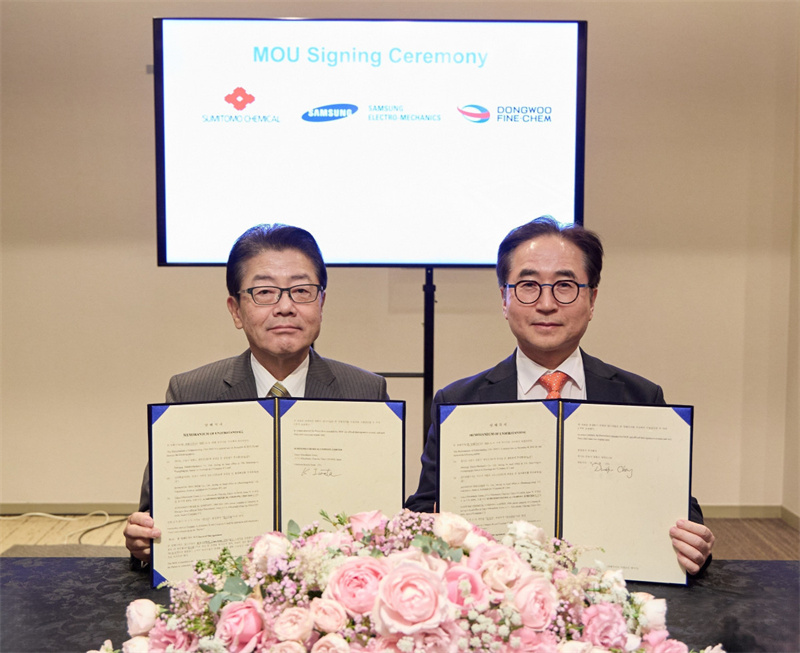South Korean advanced substrate manufacturer Samsung Electro-Mechanics (009150.KS) announced on November 5 that it has signed a memorandum of understanding (MOU) with Japan's leading materials supplier Sumitomo Chemical Group (4005.T) to establish a joint venture to manufacture glass core, the essential base material for glass-based semiconductor package substrates.
The signing ceremony was held on November 4 in Tokyo and attended by Chang Duckhyun, President of Samsung Electro-Mechanics; Keiichi Iwata, Chairman of Sumitomo Chemical; Nobuaki Mito, President of Sumitomo Chemical; and Lee Jongchan, President of Dongwoo Fine-Chem, a Sumitomo subsidiary.
The joint venture aims to address the physical limitations of conventional organic PCB substrates as artificial intelligence (AI) and high-performance computing (HPC) dramatically increase chip heat generation and data processing requirements. Glass core offers lower thermal expansion, superior flatness, and compatibility with high-density, large-area packaging—making it a critical material for next-generation semiconductor substrates.
Through the MOU, Samsung Electro-Mechanics, Sumitomo Chemical, and Dongwoo Fine-Chem will combine their respective technologies and global networks to build manufacturing and supply capabilities for glass core materials. Samsung Electro-Mechanics will hold a majority stake in the joint venture, while Sumitomo Chemical Group will participate as a minority shareholder. The companies plan to finalize the main agreement next year, including shareholding structure, timeline, and the corporate name. The headquarters will be located at Dongwoo Fine-Chem's Pyeongtaek site in South Korea, which will also serve as the initial production base.

Chang Duckhyun said the rapid rise of AI is driving strong demand for ultra-high-performance semiconductor package substrates. "Glass core will be a key material that reshapes the future substrate market," he said, adding that the agreement creates a new growth engine for advanced packaging. Keiichi Iwata commented that the collaboration will generate significant synergy in the semiconductor back-end process and strengthen the long-term partnership between the companies.
Samsung Electro-Mechanics has already built a pilot line at its Sejong plant and is producing sample glass package substrates, with mass production targeted for 2027.
The shift toward glass substrates reflects a broader industry transition as semiconductor performance competition moves from chip design to substrate innovation. Glass substrates can improve data transmission speed by up to 40% and reduce power consumption by around 30%, directly benefiting AI servers, GPUs, CPUs, and ASICs. This evolution is expected to create new opportunities and challenges for the PCB industry, particularly in high-precision manufacturing, material development, and equipment upgrades.
Samsung Electro-Mechanics is currently seen as the front-runner in glass substrate commercialization. It has reportedly supplied sample glass substrates to Broadcom, raising expectations of future supply to global AI chip leaders such as Google, Meta, OpenAI, and Apple. Korean companies including LG Innotek and SKC are also entering the glass substrate sector, intensifying competition.
Industry analysts expect 2026 to 2027 to be a key inflection point for glass substrate commercialization. For the PCB industry, the transition from organic substrates to glass is no longer just a material shift but a structural transformation in semiconductor packaging.
+86 191 9627 2716
+86 181 7379 0595
8:30 a.m. to 5:30 p.m., Monday to Friday
